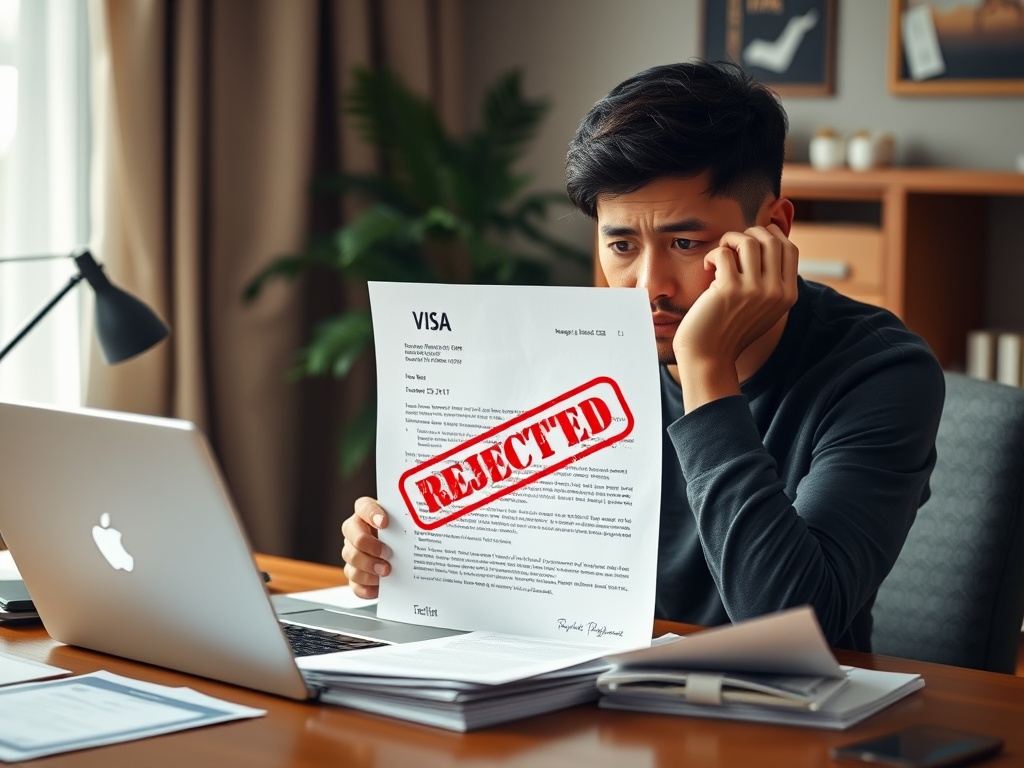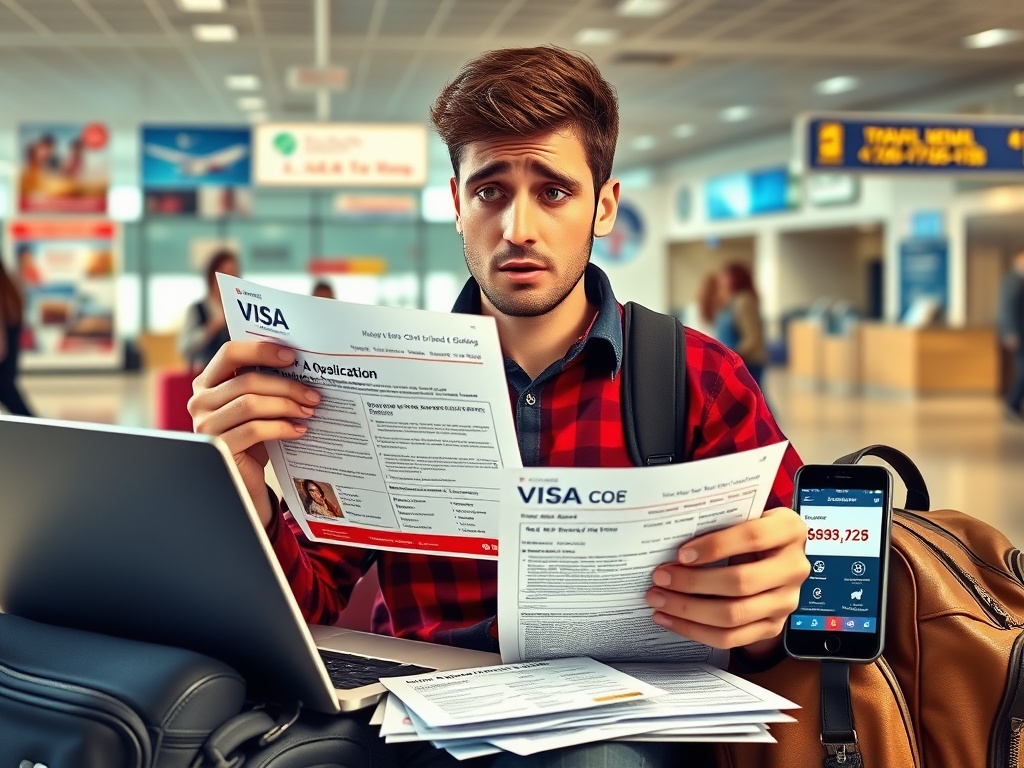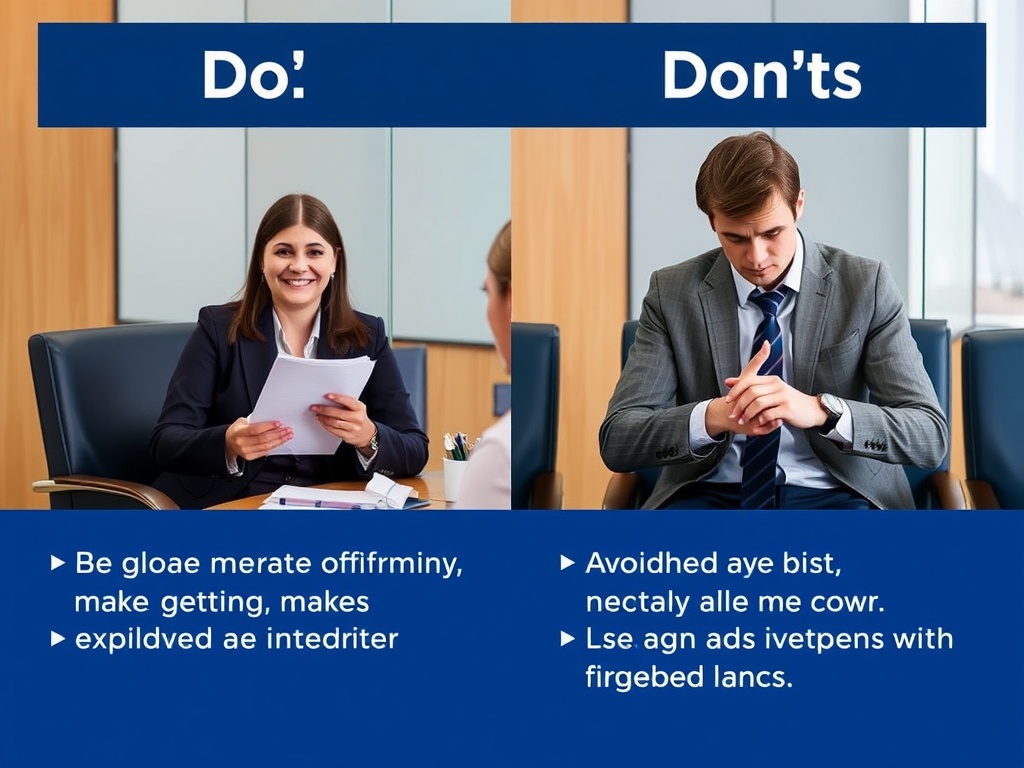Understanding the Reasons Behind Your Visa Rejection

When applicants receive a visa rejection, it can feel like a door has been slammed shut on their dreams. However, understanding the reasons behind this denial can empower you to take the right steps toward a successful appeal. The first step is to carefully analyze the rejection letter provided by the consulate or embassy. This letter usually contains specific grounds for the denial, which can serve as a roadmap for your appeal process.
- Insufficient Financial Evidence: Many applicants fail to provide adequate proof of financial stability, crucial for demonstrating the ability to support themselves during their stay.
- Lack of Strong Ties to Home Country: Visa officers often look for evidence that you will return home after your visit. Weak ties can lead to suspicions of intention to overstay.
- Incomplete Application or Documentation: Missing documents or information can lead to automatic rejection. Ensuring that every required document is attached is vital.
- Previous Immigration Violations: A history of overstaying or other violations can negatively impact your current application.
Visa officers are trained to assess applications based on specific criteria and guidelines. Their primary responsibility is to uphold the integrity of the immigration system, which sometimes necessitates rejecting applications that do not meet the required standards. By appreciating their perspective, you can better craft your appeal to address their concerns directly.
When reviewing your application, consider how the information you provided may have been interpreted. For instance, if your financial documentation was insufficient, you might want to bolster this aspect in your appeal by providing additional bank statements or proof of income. Similarly, if you lacked strong ties to your home country, consider how to better demonstrate these ties, perhaps through employment letters or property ownership documents.
Once you have identified the reasons for your visa rejection, the next step is to formulate a robust appeal strategy. This involves not only addressing the specific reasons for your rejection but also presenting your case in a compelling manner that reassures the visa officer of your intentions.
Here are some effective strategies to consider:
- Thoroughly Review Your Application: Go through your application and the rejection letter to identify discrepancies or weaknesses.
- Gather Supporting Documents: Collect additional evidence that directly addresses the reasons for denial.
- Write a Compelling Appeal Letter: Clearly articulate your situation, addressing each reason for denial with factual counterarguments.
- Consult with an Immigration Expert: If possible, seek guidance from an immigration attorney to ensure your appeal is as strong as possible.
Crafting a Compelling Appeal Letter: Key Elements to Include

Writing an effective appeal letter is critical in turning your rejection into a success story. The appeal letter serves as your opportunity to present your case in a structured manner, addressing the specific reasons for your visa denial. To create an impactful appeal, you must ensure that your letter has a clear structure, which not only makes it easier for the visa officer to read but also enhances your chances of a favorable outcome.
Begin with a respectful salutation, followed by a concise introduction that states your purpose clearly. This sets the tone for the letter and shows that you are serious about your appeal. Include your personal information, such as your full name, contact details, and application number. This information is essential for the visa office to easily identify your case.
In this portion of your letter, it’s crucial to directly confront the reasons for your visa denial. Each point raised in the rejection letter should be addressed systematically. For instance, if the denial was due to insufficient financial evidence, be sure to provide additional documentation such as bank statements, pay slips, or affidavits that bolster your claims of financial stability. Highlighting these documents not only demonstrates your commitment but also reassures the visa officer of your capability to support yourself during your stay.
Moreover, if the rejection stemmed from a perceived lack of ties to your home country, make a strong case by including evidence such as employment contracts, property deeds, or family connections. This information can significantly enhance your appeal, reinforcing your intention to return home after your visit. The goal is to provide a robust counter-narrative that addresses each concern raised in a logical and convincing manner.
As you wrap up your appeal letter, it’s important to reiterate your respect for the visa process and the role of the officers in maintaining its integrity. Express your genuine desire to comply with all regulations while highlighting your commitment to return to your home country. A statement of gratitude for the opportunity to appeal may also leave a positive impression.
Before submitting your letter, ensure it is free of grammatical errors and typos, as these can detract from your professionalism. Consider having someone review your letter for clarity and impact. Remember, a strong closing can be just as impactful as the opening; thus, end with a polite request for reconsideration of your application.
Gathering Supporting Documents: Strengthening Your Case
Once you have received a visa rejection, the next pivotal step in your appeal process involves gathering supporting documents. This phase is crucial, as it enables you to present a more compelling case to the visa officer. By carefully curating a set of documents that directly address the reasons for your denial, you can significantly enhance your chances of a successful appeal.
The first aspect to consider is the specific reasons outlined in your rejection letter. For instance, if your application was denied due to a lack of financial proof, it is essential to compile a comprehensive array of financial documents. This could include recent bank statements, detailed pay slips, or even affidavits from sponsors who can attest to your financial standing. The aim is to create a robust financial profile that reassures the visa officer of your ability to support yourself during your intended stay.
Another common ground for visa denials is the perceived weakness of ties to your home country. To counter this, you should gather documents that effectively demonstrate your connections back home. This could consist of employment verification letters that outline your role and responsibilities, showing a commitment to your job. Additionally, including proof of property ownership or rental agreements can serve as evidence that you have a stable residence waiting for your return.
Furthermore, highlighting family connections through birth certificates or proof of dependents can strengthen your case. Visa officers often look for assurances that applicants will return to their home country after their travel, so every piece of evidence you provide should serve to reinforce this notion.
In assembling your portfolio of supporting documents, organization is key. Consider creating a table that categorizes your documents based on the reasons for your rejection. This not only helps you keep track of what you have gathered but also presents a clear and organized view to the visa officer. For example, you might have a section for financial documents, another for ties to your home country, and perhaps a third for any additional evidence that supports your claim.
| Document Type | Purpose |
|---|---|
| Bank Statements | Prove financial stability |
| Employment Letters | Demonstrate strong ties to home |
| Property Deeds | Show intention to return |
| Family Documents | Highlight family connections |
In conclusion, gathering supporting documents is not just a checkbox activity; it’s a strategic move that can turn the tide in your favor. By presenting a well-rounded and meticulously organized portfolio that addresses the visa officer’s concerns, you can significantly bolster your chances of a successful appeal. Remember, the goal is to present a narrative that instills confidence in your intentions and capabilities.
Navigating the Appeal Process: Step-by-Step Guide
When faced with a visa rejection, it can be daunting to navigate the appeal process. However, knowing the steps involved can significantly increase your chances of success. This section provides a clear roadmap to help you approach your appeal with confidence. A well-structured appeal not only addresses the reasons for denial but also demonstrates your commitment to complying with immigration regulations.
To ensure a thorough and effective appeal, consider the following steps that will guide you through the process:
- Review the Rejection Letter: Begin by meticulously analyzing the rejection letter to understand the specific grounds for denial. This is your starting point for crafting a targeted appeal.
- Gather Additional Evidence: Compile supporting documents that directly address the reasons outlined in the rejection. This may include financial statements, employment verification letters, and proof of family ties.
- Write a Comprehensive Appeal Letter: Draft a clear and concise appeal letter that systematically addresses each point raised in the rejection. Use factual counterarguments to reinforce your case.
- Consult with an Immigration Professional: If possible, seek the expertise of an immigration attorney. Their experience can provide valuable insights and enhance the quality of your appeal.
- Submit Your Appeal Timely: Pay attention to deadlines for submitting your appeal. Ensure that you provide all necessary documentation and submit everything well within the stipulated time frame.
After submitting your appeal, it’s crucial to stay informed about its status. Many immigration offices provide a way to check the status of your appeal online or through customer service. Maintaining open communication with the immigration authorities can also demonstrate your proactive approach and may help address any additional questions they might have. Remember, the appeal process can take time, so patience is essential. Keep your documents organized and be prepared to respond promptly to any requests for further information.
Common Mistakes to Avoid When Appealing a Visa Rejection
Appealing a visa rejection can be a daunting endeavor, and many applicants fall into common pitfalls that can jeopardize their chances of success. By being aware of these mistakes, you can better prepare yourself to craft a solid appeal and present your case effectively. Below, we highlight several critical missteps to avoid during your appeal process.
While it is natural to feel frustrated or disappointed after a rejection, allowing emotions to seep into your appeal letter can weaken your case. Visa officers are trained to evaluate applications based on factual data and compliance with immigration policies. Strive to maintain a professional tone throughout your correspondence.
One of the most frequent mistakes applicants make is failing to systematically address each reason outlined in the rejection letter. Ignoring specific concerns can give the impression that you are not taking the appeal seriously. Instead, ensure that your appeal letter includes a detailed response to every point raised by the visa officer, effectively countering their rationale with supporting evidence.
Providing disorganized or incomplete documentation can lead to further confusion and may result in another rejection. It is imperative to carefully review your documents and ensure they are comprehensive and logically arranged. Below is a checklist of essential documents to include:
| Document Type | Purpose |
|---|---|
| Financial Statements | Prove your financial capability |
| Employment Verification | Demonstrate ties to your home country |
| Family Documents | Show connections that necessitate your return |
In conclusion, avoiding these common mistakes can significantly enhance your chances of a successful visa appeal. By maintaining professionalism, addressing all concerns systematically, and organizing your documents effectively, you can present a compelling case that resonates with the visa officer’s expectations.
Leveraging Professional Help: When to Seek Legal Assistance
In the complex landscape of immigration law, navigating the appeal process for a rejected visa application can be overwhelming. Many applicants find themselves at a crossroads, unsure whether they should tackle the appeal alone or seek professional help. The decision to engage an immigration attorney or legal expert can significantly influence the outcome of your appeal, especially if the rejection stemmed from intricate legal issues or misinterpretations of your case.
Recognizing the Signs for Legal Support is essential in determining the right time to seek professional assistance. If your visa application was denied on grounds that involve complex regulations or if you have previously faced rejections, it may be prudent to consult an immigration attorney. These professionals possess the expertise to analyze your case, identify potential pitfalls, and provide tailored strategies to enhance your appeal. Their understanding of the nuances within immigration law can be invaluable, particularly when addressing specific reasons for denial, such as financial insufficiency or lack of ties to your home country.
Moreover, if your case involves multiple factors that may complicate your situation, such as previous immigration violations or unique personal circumstances, the guidance of a legal expert can help clarify these complexities. They can assist in gathering appropriate documentation, ensuring that your appeal is comprehensive and well-structured. The attorney can also help you draft an appeal letter that effectively addresses each point raised in your rejection letter, presenting your case in a manner that resonates with visa officers.
Evaluating the Cost-Benefit Ratio of hiring legal assistance is another critical factor to consider. While there is an associated cost with retaining an attorney, their expertise may lead to a higher likelihood of success in your appeal. It is essential to weigh the potential benefits against the financial investment. Calculate the implications of another denial, which could further complicate your immigration prospects, versus the cost of professional representation. Often, the peace of mind that comes with expert guidance outweighs the financial burden.
| Factors to Consider | Self-Representation | Legal Assistance |
|---|---|---|
| Complexity of Case | May lead to oversights | Thorough understanding of law |
| Previous Denials | Possible repetition of mistakes | Strategic approach to address issues |
| Financial Implications | Potential for additional costs | Higher chance of approval |
Ultimately, the decision to leverage professional help in your visa appeal should be based on a careful assessment of your individual circumstances. If you find yourself feeling uncertain or overwhelmed by the complexities of the appeal process, reaching out to an immigration attorney could be the best course of action. Their knowledge and experience can empower you to present a more compelling case, increasing the likelihood of a successful outcome.
Preparing for a Possible Interview: Tips for Success
As you navigate the appeal process following a visa rejection, it is essential to prepare yourself for a possible interview with the visa officer. This meeting could serve as a pivotal moment in your appeal journey, offering you the opportunity to clarify any misunderstandings and present your case in person. Adequate preparation can make a significant difference in the outcome, allowing you to address concerns directly and demonstrate your commitment to adhering to immigration regulations.
Before stepping into the interview room, it is crucial to familiarize yourself with the dynamics of the visa interview process. Visa officers are trained to evaluate your intentions, financial stability, and ties to your home country during this conversation. Keeping this in mind, you should be prepared to confidently articulate your reasons for travel, the purpose of your stay, and your plans to return home. Your demeanor and clarity of thought can greatly influence the officer’s perception of your application.
To optimize your chances of a favorable outcome, employ the following strategies during your interview:
- Be Honest and Transparent: Always provide accurate information and be forthcoming about your previous application and the reasons for its denial.
- Practice Common Questions: Familiarize yourself with typical interview questions. This may include inquiries about your travel plans, financial means, and ties to your home country.
- Dress Professionally: First impressions matter. Dressing appropriately can show that you take the process seriously and respect the visa officer’s role.
- Bring Supporting Documents: Have copies of all relevant documents on hand to reference during the interview, including your appeal letter and any new evidence you have gathered.
- Stay Calm and Collected: Nervousness is natural, but maintain a composed demeanor. Take your time to answer questions thoughtfully.
Visualizing a successful interview can significantly bolster your confidence. Imagine the interaction going smoothly, with you providing clear responses and effectively addressing the visa officer’s concerns. This mental preparation can help alleviate anxiety. It is also helpful to rehearse your responses with a friend or family member, allowing you to refine your answers and receive constructive feedback.
Ultimately, preparing for a possible interview is an integral part of your visa appeal process. By understanding the interview dynamics and employing effective strategies, you can present your case convincingly and increase your chances of a successful outcome.



